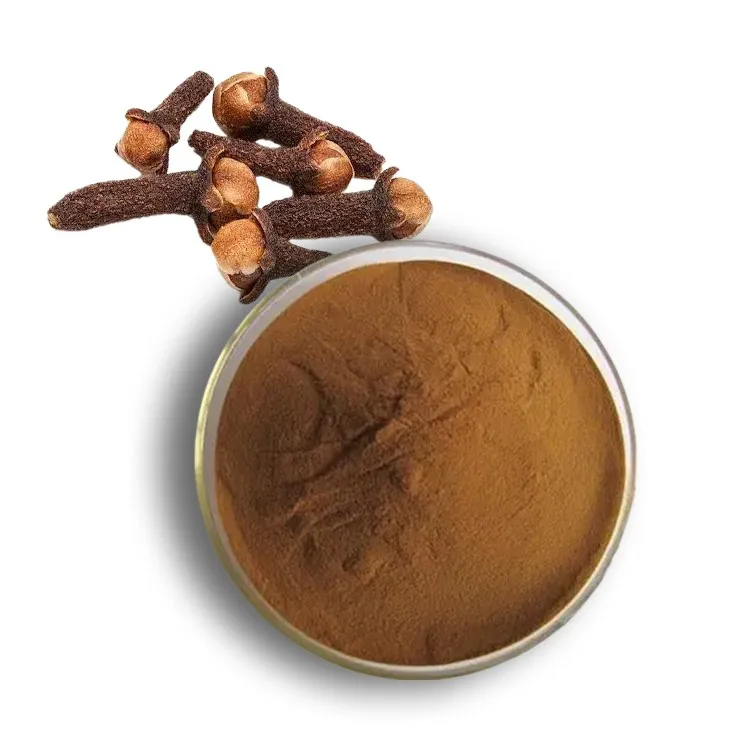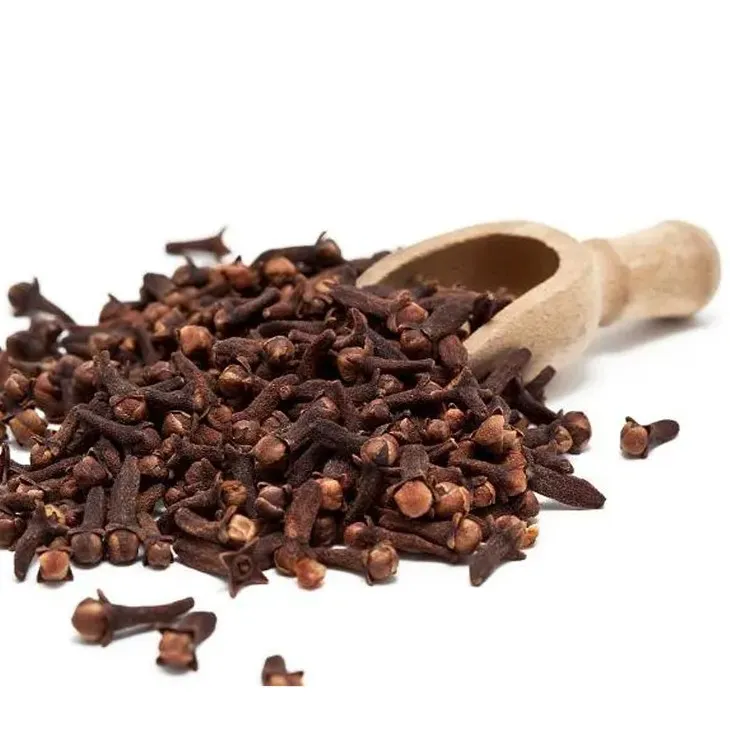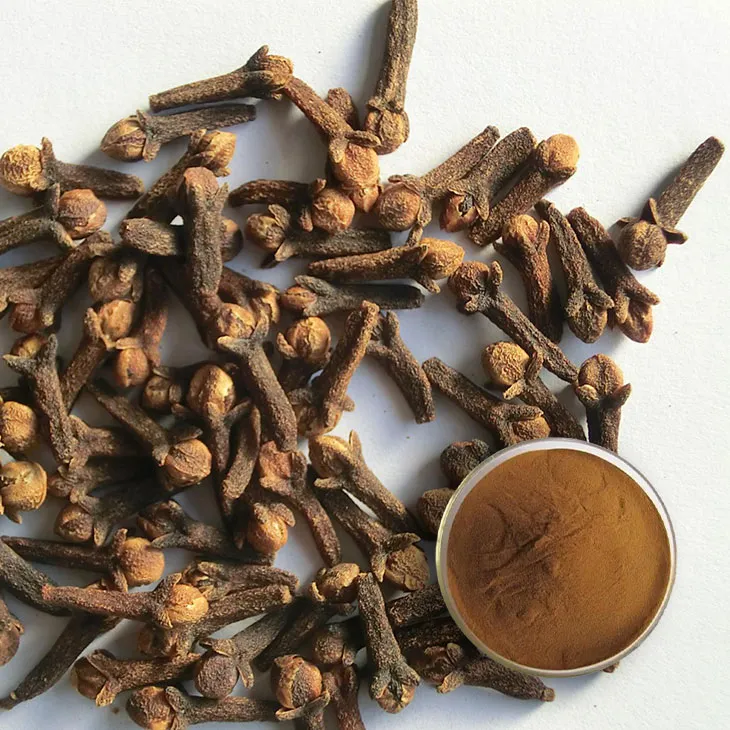- 0086-571-85302990
- sales@greenskybio.com
Clove powder
2024-11-13

1. Introduction to Clove Powder
Clove Powder is a derivative of cloves, which are the dried flower buds of the Syzygium aromaticum tree. These small, reddish - brown buds are native to the Maluku Islands in Indonesia but are now cultivated in many tropical regions around the world. The process of turning cloves into powder involves drying them thoroughly and then grinding them into a fine, aromatic powder. This powder has a warm, sweet, and spicy aroma that is instantly recognizable and has made it a popular ingredient in various fields.

2. Culinary Uses of Clove Powder
2.1 Meat Seasoning
In the world of cuisine, clove powder is highly regarded as a meat seasoning. It has the ability to penetrate the fibers of meats such as beef, pork, and lamb, enhancing their natural flavors. When used in marinades or rubs, it adds a depth of flavor that is both complex and alluring. For example, in a traditional Christmas ham recipe, a sprinkle of clove powder along with other spices like cinnamon and nutmeg can transform an ordinary ham into a festive and delicious centerpiece. The clove powder helps to cut through the richness of the meat and provides a warm, spicy note that complements the saltiness and sweetness of the ham.
2.2 Vegetable Enhancement
Clove powder also plays a role in enhancing the flavor of vegetables. It can be used sparingly in dishes like roasted root vegetables. When combined with olive oil, salt, and other herbs, a pinch of clove powder can add an unexpected and delightful twist to the earthy flavors of carrots, parsnips, and potatoes. It can also be used in stews or curries that contain a variety of vegetables. The warm and spicy nature of the clove powder helps to bring out the best in the vegetables, creating a more harmonious and flavorful dish.
2.3 Desserts
In the realm of desserts, clove powder is a unique and interesting addition. It can be used in baked goods such as cakes, cookies, and pies. For instance, in a spiced apple pie, a small amount of clove powder can enhance the flavor of the apples and add a warm, cozy feeling to the dessert. It also pairs well with chocolate in some recipes, adding a touch of mystery and depth to chocolate - based desserts. Additionally, in some traditional Middle Eastern and Indian sweets, clove powder is used to create a complex and indulgent flavor profile.
3. Medicinal Properties of Clove Powder
3.1 Digestive Benefits
Clove powder has long been used in traditional medicine for its digestive benefits. It has the ability to soothe the stomach and relieve digestive discomfort. Clove powder contains compounds such as eugenol, which has anti - inflammatory properties. These properties can help to reduce inflammation in the digestive tract, which may be caused by factors such as indigestion or food intolerances. In some cultures, a cup of warm tea made with clove powder is recommended for those experiencing nausea or an upset stomach.
3.2 Antimicrobial Effects
Another important medicinal property of clove powder is its antimicrobial effects. Eugenol, the main active compound in cloves, has been shown to have antibacterial, antifungal, and antiviral properties. This makes clove powder potentially useful in fighting off infections. In traditional medicine, it has been used to treat oral infections such as toothaches. A paste made from clove powder and a small amount of water can be applied directly to the affected area to relieve pain and fight off bacteria. It may also be used in natural remedies for skin infections, although more research is needed to fully understand its effectiveness in this regard.
3.3 Anti - Inflammatory Actions
As mentioned earlier, the anti - inflammatory actions of clove powder are not limited to the digestive tract. It can also have a positive impact on the body's overall inflammatory response. Chronic inflammation is associated with many health problems, including heart disease, diabetes, and arthritis. By incorporating clove powder into the diet or using it in traditional medicine remedies, it may be possible to help reduce the body's level of inflammation. However, it should be noted that while clove powder may have these potential benefits, it is not a substitute for medical treatment in cases of serious illness.
4. Cosmetic Applications of Clove Powder
4.1 Fragrance in Cosmetics
In the cosmetic industry, the pleasant scent of clove powder makes it a desirable ingredient in various products. It can be found in perfumes, body lotions, and bath products. The warm, spicy aroma of clove powder adds a touch of luxury and exoticism to these products. It is often used in combination with other floral or spicy scents to create a unique and alluring fragrance profile. For example, in some high - end perfumes, a hint of clove powder is blended with rose and vanilla to create a complex and sophisticated scent.
4.2 Skin - Enhancing Qualities
Clove powder also has potential skin - enhancing qualities. It has antioxidant properties, which can help to protect the skin from damage caused by free radicals. Free radicals are unstable molecules that can cause oxidative stress in the skin, leading to premature aging, wrinkles, and other skin problems. By using products containing clove powder, it may be possible to help combat these effects. Additionally, some traditional beauty remedies use clove powder for its exfoliating properties. A gentle scrub made from clove powder and other natural ingredients can help to remove dead skin cells, leaving the skin looking smoother and more radiant. However, it is important to note that clove powder should be used with caution on the skin, as it can be irritating in high concentrations.5. How to Store Clove Powder
To ensure the longevity and quality of clove powder, proper storage is essential. Clove powder should be stored in an airtight container in a cool, dry place. Exposure to air, moisture, and heat can cause the powder to lose its flavor and potency. If stored correctly, clove powder can retain its properties for up to a year. It is also important to keep it away from strong - smelling substances, as it can absorb odors easily.
6. Precautions When Using Clove Powder
While clove powder has many beneficial properties, there are also some precautions to be aware of. As mentioned earlier, it can be irritating to the skin in high concentrations, so it should be used sparingly in cosmetic applications. In addition, when using clove powder for medicinal purposes, it is important to consult a healthcare professional, especially if you have underlying health conditions or are taking medications. Some people may be allergic to cloves or clove powder, and ingestion or excessive use may cause adverse reactions such as allergic rashes, breathing difficulties, or digestive problems.
7. Conclusion
Clove powder is truly a multi - faceted substance with a wide range of uses. Whether in the kitchen, in traditional medicine, or in the cosmetic industry, it offers unique and valuable properties. However, it is important to use it with care and knowledge, taking into account its potential benefits as well as the precautions associated with it. As research continues, we may discover even more about the potential of this remarkable powder.
FAQ:
What are the main uses of clove powder in cuisine?
Clove powder is mainly used as a seasoning in cuisine. It can enhance the flavor of meats, making them more fragrant and delicious. For vegetables, it can add a unique and warm flavor. In desserts, it imparts a rich and exotic taste, often used in spiced cakes, cookies, and puddings.
How does clove powder benefit the stomach in traditional medicine?
In traditional medicine, clove powder has certain properties that can soothe the stomach. It may help with digestive problems such as indigestion, flatulence, and mild stomach cramps. The active compounds in clove powder are believed to have anti - inflammatory and antispasmodic effects on the digestive tract.
What makes clove powder suitable for the cosmetic industry?
Clove powder is suitable for the cosmetic industry due to its pleasant scent. It gives products a warm, spicy, and inviting aroma. Moreover, it has potential skin - enhancing qualities. It may have antibacterial and antifungal properties, which can be beneficial for maintaining healthy skin and preventing certain skin infections.
How is clove powder made from cloves?
Clove powder is made by drying cloves first. Once the cloves are thoroughly dried, they are ground into a fine powder. The grinding process should be done carefully to ensure a consistent texture and to preserve the flavor and properties of the cloves.
Are there any precautions when using clove powder?
Yes, there are some precautions when using clove powder. In large amounts, it can be irritating to the skin and mucous membranes. Also, some people may be allergic to cloves or clove powder, so it's important to do a patch test if using it in a new cosmetic product. Ingesting excessive amounts may also cause adverse effects on the digestive system, so it should be used in moderation in cooking.
Related literature
- The Chemical Composition and Therapeutic Properties of Clove Powder"
- "Clove Powder in Culinary Arts: A Comprehensive Review"
- "Clove Powder in Cosmetics: Safety and Efficacy"
- ▶ Hesperidin
- ▶ citrus bioflavonoids
- ▶ plant extract
- ▶ lycopene
- ▶ Diosmin
- ▶ Grape seed extract
- ▶ Sea buckthorn Juice Powder
- ▶ Beetroot powder
- ▶ Hops Extract
- ▶ Artichoke Extract
- ▶ Reishi mushroom extract
- ▶ Astaxanthin
- ▶ Green Tea Extract
- ▶ Curcumin Extract
- ▶ Horse Chestnut Extract
- ▶ Other Problems
- ▶ Boswellia Serrata Extract
- ▶ Resveratrol Extract
- ▶ Marigold Extract
- ▶ Grape Leaf Extract
- ▶ blog3
-
Cranberry Plants and Skin - care Products.
2024-11-13
-
Curcumin
2024-11-13
-
Green Tea Extract
2024-11-13
-
Echinacea Extract
2024-11-13
-
Chasteberry Extract
2024-11-13
-
Peppermint Oil
2024-11-13
-
White mustard seed extract
2024-11-13
-
Jujube Extract
2024-11-13
-
Coconut Water Powder
2024-11-13
-
Hericium erinaceus extract powder
2024-11-13
-
Epimedium extract powder
2024-11-13





















